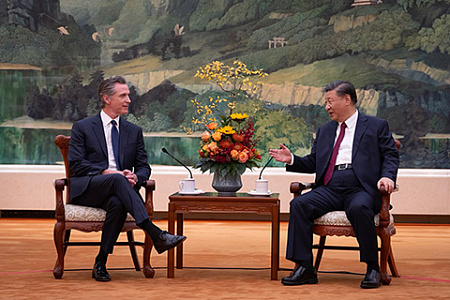In the United States, they dream of the collapse of Chinese power in the Indo-Pacific region
Western forecasts regarding the projection of US power in the Indo-Pacific region (ITR) often paint a gloomy scenario for Americans of the outbreak of war between China and the United States as a result of clashes at sea over Taiwan.
But recently, other scenarios have been appearing. For example, the collapse of Chinese influence in the IT industry as a result of the internal destabilization of the Chinese government is being considered. Or as a result of a regional collapse comparable to the collapse of the USSR. In such scenarios, a power vacuum is created in the region, which the United States should be ready to fill.
The prospect of war in the ITR has been repeatedly portrayed by geopoliticians and science fiction writers. But this would be a truly nightmarish scenario, according to Western experts. An open war between the United States and China would mean the first direct clash of nuclear powers in the 21st century. And this is not to mention the risk of both powers starting a "non-kinetic" (energy, cybernetic, information) war. The probability of such a development exists, although it is not too high today.
First, both powers are well acquainted with the theories of nuclear deterrence during the Cold War, which formed the doctrine of "mutually assured destruction" (English: mutually assured destruction, MAD, which is consonant with the word "insane"). In the American tradition, these ideas are developed in classic works such as "Nuclear Weapons and Foreign Policy" by Henry Kissinger or "Weapons and Influence" by Thomas Schelling. Scientists, military leaders and politicians around the world, as is commonly believed, are well aware that the threat of a nuclear catastrophe keeps the hands of world leaders away from the "red buttons".
All this, however, does not exclude puppet conflicts and proxy wars in the IT industry. And this topic is more interesting than the imaginary collapse of Chinese influence in the region.
Until now, the United States has always been lucky when it comes to internal transformations in China. Deng Xiaoping's rise to power in the 1980s and China's entry into the World Trade Organization (WTO) in 2001 gave American politicians hope that China would be included in the international "rules-based order" - and the rules would be determined by the United States. But, like many other optimistic forecasts of the American foreign policy elite, this scenario turned out to be unrealistic. The dilemma of China's accession to the World Trade Organization, in particular, was discussed in Philip Levy's article "Was China's admission to the WTO a mistake?" in Foreign Affairs magazine in 2018.
In October 2023, Xi Jinping met with California Governor Gavin Newsom (who is considered a possible presidential candidate from the Democratic Party). After that, the Voice of America radio and Internet publication supported by the American government (recognized as a foreign agent in the Russian Federation) set an immoderately optimistic tone in the article "China and the United States seek warmer relations?" on October 26.
This optimism, some American observers note, as in the case of U.S. support for China's accession to the WTO, may prove dangerous. But not because of the possibility of targeted aggressive attacks by China under the leadership of President Xi Jinping, but because of the historical precedent associated with a similar scenario of reconciliation between the United States and another rival power of the late twentieth century – the Soviet Union.
In November, President Xi Jinping and President Joseph Biden met in San Francisco at the Asia-Pacific Economic Cooperation (APEC) summit. And although there were no obvious signs of warming relations (the parties only "agreed to continue to negotiate"), the general tone of the American press remains moderately optimistic.
Xi Jinping today reminds American experts of Soviet leader Mikhail Gorbachev, who connived at the collapse of communist power in Eastern Europe and Central Asia. It is enough to trace the historical path traversed by the countries of the ITR to understand what the "road map" of the gradual decline of Chinese power under Xi Jinping might look like, according to America.
President Xi Jinping, according to publications in the Western press, found himself in a situation very similar to that of Mikhail Gorbachev. In seeking warmer relations with the United States under the Joseph Biden administration, President Xi Jinping (perhaps unintentionally) is taking the path of reducing Chinese influence in the IT industry. American politicians seem to welcome such changes, considering them as new opportunities for expanding American influence in the region.
However, such optimism may turn out to be wrong. History never repeats itself literally, but it rhymes too often. The consequences of the collapse of the Soviet Union are not an epic worth re–reading, the American press notes. Therefore, American politicians should also consider such a scenario: the possible collapse of Chinese power in the IT industry and the dangers that this collapse may eventually bring.
How justified such bold predictions are and to what extent they are caused by the unshakeable faith of Americans in their luck and exclusivity is a question we do not consider here. But even such scenarios and forecasts should be taken into account if we are talking about the sentiments of the American ruling class.
Vasily Ivanov

